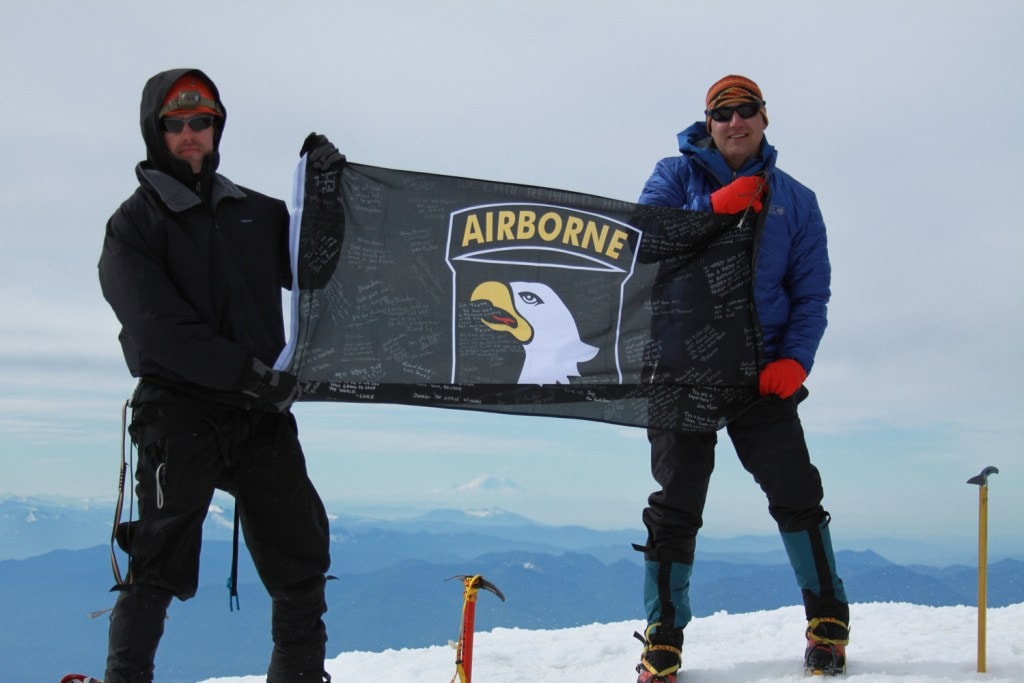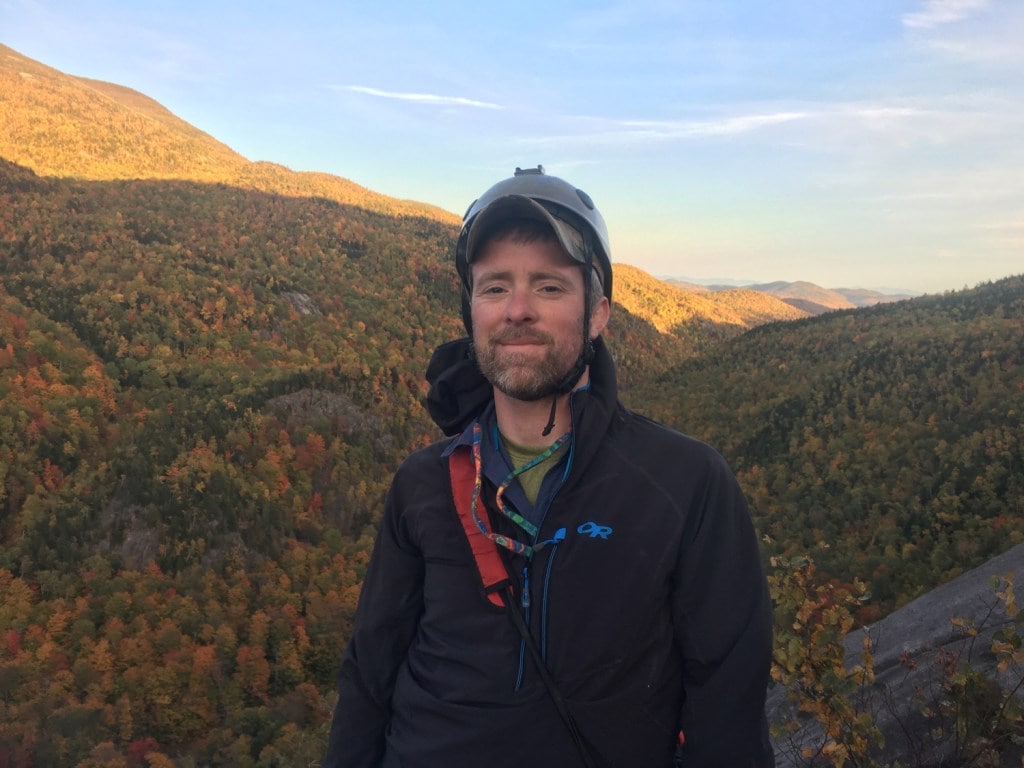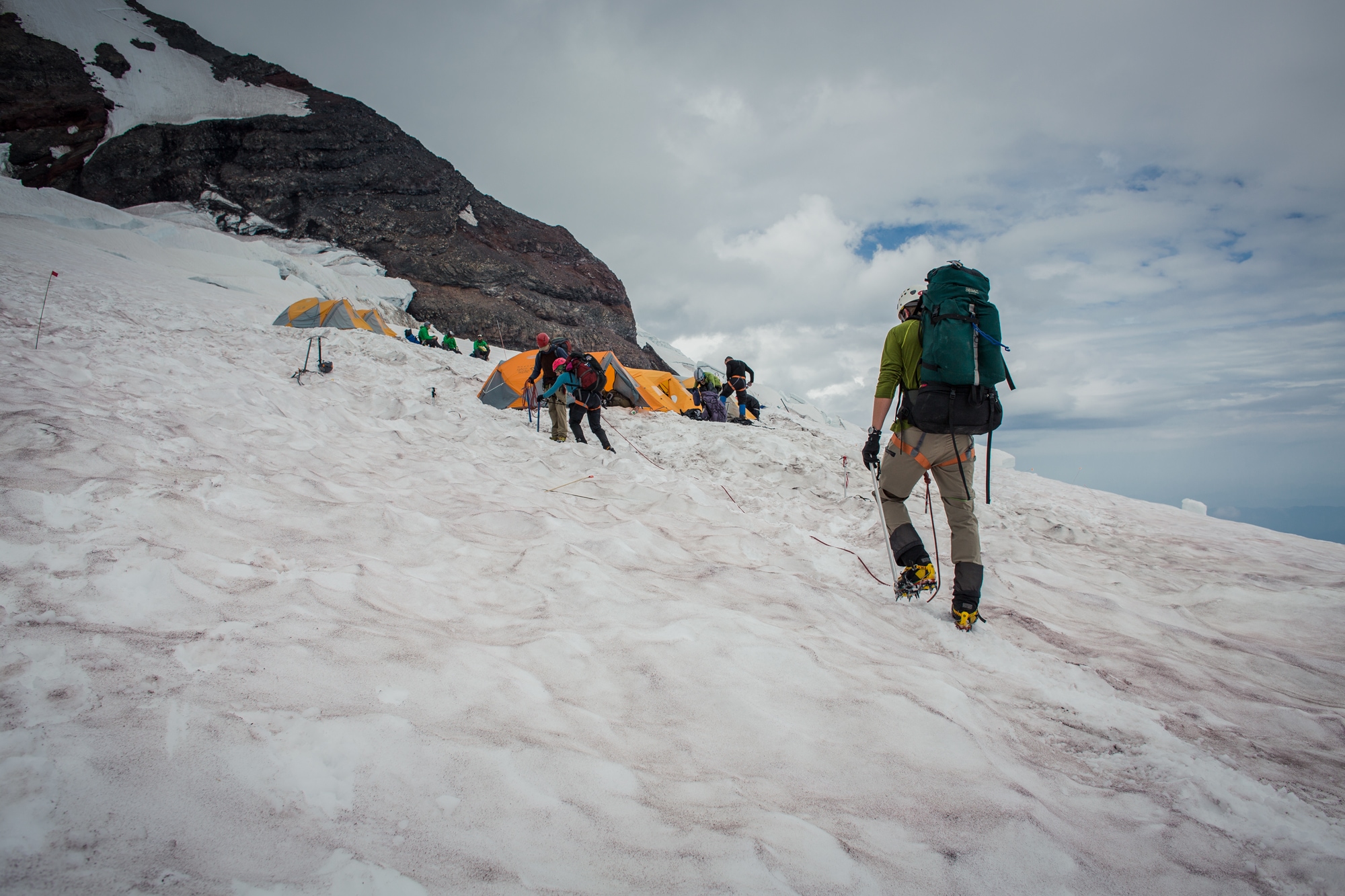Editor’s note: This story was originally published on October 22, 2018 and updated on October 25, 2022.
One fall day on Washington’s Mount Rainier, Josh Brandon and a group of fellow active duty platoon leaders discovered something about the outdoors that could improve the lives of veterans.
It was September 2009 and the group had decided to make a late-season summit attempt of Washington’s highest peak as part of a team-building exercise. The platoon leaders, who were all members of the same infantry company, began their climb in the early morning hours. Conditions were windy—a storm was forecast for later that day. About halfway up Disappointment Cleaver, the team paused to collect their bearings and a leader was hit in the neck with a boulder, resulting in a spinal contusion. Drawing on their previous military training, the group treated his injury and evacuated him to safety by nightfall.
“We figured out that mountaineering replicated the best parts of combat,” said Brandon. “A small, tight group. Taking risks. Facing adversity. Out there in nature.”
A former U.S. Army infantry officer who served three tours in Iraq, Brandon was awarded the Silver Star Medal and two Bronze Stars with Valor following his second deployment in 2006. He knew then that something was wrong and suspected he had post-traumatic stress disorder (PTSD), but didn’t seek a professional diagnosis for five more years. Brandon is among the 11 to 20 percent of veterans who served in Iraq or Afghanistan with PTSD. After his third deployment and 10 years of service, Brandon returned home to Fort Lewis, Washington, in 2010.
Back in the Seattle area, Brandon resumed alpine climbing. The sport replicates the best parts of combat, he says, in that it requires a team to work together to assess risk and overcome challenges. Soon Brandon was using his trips into the mountains to support other soldiers like him, “I felt like I was continuing to serve [and] doing something good beyond what I did in war,” he says.
This experience inspired Brandon to start his own nonprofit, Hound Summit Team, to provide opportunities for building confidence, physical ability and leadership on mountain expeditions for veterans with PTSD and combat-related injuries. In 2013, he partnered with the national Sierra Club Military Outdoors program.
Over the next five years, anecdotal evidence of the power of nature for these veterans groups began to pile up. Brandon noticed participants began to trust one another and develop a sense of purpose through the biweekly outdoor activities, which included hiking, climbing and rafting.

“At first, people might be standoffish or nervous,” Brandon says. “But it only takes one or two iterations before they build on that trust factor and start coming together as a group. Sense of belonging goes up. Then they physically get stronger and better. And the mental component gets easier.”
During their off weeks, some of the veterans also started grabbing lunch or taking classes together. “They were building small, healthy social groups and a sense of community,” Brandon says.
After participating in/completing the program, Brandon reports that some of the veterans with PTSD, anxiety or depression noticed improvements in self-confidence, diminished reliance on medications and alcohol, and the benefit of having someone with a similar background to talk to.
“I can tell feel-good stories or give high-fives for the rest of my life, but mental health care is a huge crisis in our country right now,” he says. In order to change people’s perceptions about the health benefits of nature and develop effective treatments for veterans with PTSD and other related mental health conditions, Brandon knew evidence-based research was needed to back up the anecdotal evidence he witnessed firsthand.
“There was almost zero data on it,” says Brandon. “You can only go to a member of Congress, a general or a CEO once and they want to see that information.”
In 2014, Brandon met Marc Berejka, then the director of community and government affairs for REI Co-op, at Outdoor Retailer—the biggest trade show in the outdoor industry. Berejka knew instantly that Brandon’s stories connected with what REI Co-op was already doing to amplify academic research examining nature’s impact on our physical and mental health.
Brandon and Berejka agreed there was an opportunity to investigate the void around veterans and the outdoors. To make the research a reality, they had to go through the scientific community. “It was a cool moment,” recalls Brandon. “Marc introduced me to some researchers at the University of Washington that wanted to measure what we were talking about.”

Equipped with $100,000 in seed money from REI, Brandon partnered with a research team in 2018 at the University of Washington College of the Environment to conduct a pilot study followed by a full clinical trial examining the effects of group-based expeditions with war veterans suffering from PTSD.
The team comprised an epidemiologist; a professor of nature, health and recreation; a veteran; and a vet-turned-psychologist. “The questions we have are best answered with multiple viewpoints and disciplines,” says Greg Bratman, the professor on the team and the Doug Walker Endowed Professor. (Walker was a longtime co-op member and served on the board of directors for REI Co-op.)
“Any time you have a team that’s coming together and cares about these questions, it’s exciting,” Bratman says.
During the spring of 2018, Bratman and his team conducted the first pilot study with the goal of defining and standardizing the hiking procedures. Over a three-month period, 12 veterans went on six hikes in Western Washington. This phase included figuring out how to facilitate group bonding, conduct hikes, manage logistics and make risk assessments.
After the first study, Bratman reported a positive initial response from participants: “Most people want to keep doing it. They’ve really bonded as a group. And our team will keep exploring whether this may help with these kinds of traumas—to form group bonds again and experience the therapeutic benefits as a result.”
The research continued with a second pilot study in the spring of 2019, which tested the protocol with a control group with additional questions and assessments. “What is it we need to control? How do groups move their bodies, and how do we measure that?” Bratman said, offering examples. The team also asked more specific questions to the group, like “Exactly what is feeling better and why? Are you experiencing benefits between hikes?”
Following the second pilot study, the team plans to conduct a full clinical trial, which could begin as early as 2020. Depending on how that goes, they’ll look for ways to scale their work and bring it to other programs. “This stuff is directly applicable to the population at large,” said Brandon.
“We want to shift the national narrative from the outdoors being a nice-to-have to a must-have,” Berejka said. “Increasingly we understand that ready access to natural places strengthens the social fabric—time outdoors also is good for the heart, mind and soul.”
To advance understanding of how time spent in nature improves well-being, REI pledged $1 million to support the launch of an initiative within the University of Washington’s EarthLab studying the link between human health and time spent outdoors. The initial findings of Bratman and Brandon’s research analyzing the impact of nature on veterans with PTSD were released in September of 2021.


